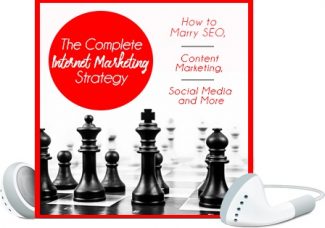 License Type: Master Resell Rights
License Type: Master Resell Rights  File Type: ZIP
File Type: ZIP
 SKU: 63896
SKU: 63896  Shipping: Online Download
Shipping: Online Download
Sample Content Preview
The Future-Proof SEO and Internet Marketing Plan
Good SEO means understanding what Google is looking for and making sure that your websites and your clients’ websites meet those criteria. But great SEO means preempting what Google is going to look like in the future and where it is heading. This way, you can ‘future proof’ your SEO against changes to the algorithm, or Google’s overall direction.
This is a lesson that SEOs have learned hard in the past. The original version of Google worked purely by looking at the number of links pointing at a website and by looking at the number of times the keywords were repeated in the text. If you wanted to get to the top of Google back then, all you had to do was to post hundreds of articles, each with keywords stuffed into it, and likewise buy lots of links, swap lots of links and upload your site to link directories.
But then Google did a U-turn. Suddenly, Google didn’t want people gaming its system any more. Suddenly Google didn’t want people creating poor quality content by ‘keyword stuffing’ any more.
And let’s be honest: it was obvious this would happen. The current system meant that anyone could get to the top of Google with a low quality site, without caring at all about the user. Google would not want to support that, because it would ultimately result in Google losing traffic.
Anyway, Google made its updates: it introduced Google Panda and Google Penguin and suddenly, thousands-if-not-millions of sites were massively downgraded. Businesses closed their doors. Entrepreneurs had to get real jobs. It was chaos!
People ranted and raved at Google for not giving warning, for not telling people what it wanted.
But Google was doing what it always did: serving the customer.
And a few clever SEOs who saw this coming were ready. They had built sites using smarter strategies and their sites were aimed at the visitors more than simply being designed to serve Google.
That is what great SEO means now. SEO is in permaflux. The algorithms are never changing. In fact, the whole point of the ‘Hummingbird algorithm’, is that it allows Google to update its index constantly and in real-time.
So you need to do better. You need to get inside the mind of Google to create a future proof SEO and internet marketing plan…
Google’s Master Plan
The Pixel 2 is Google’s second serious foray into the hardware game and represents another step in the company's grand plan to be an 'AI first' company. This may sound a little strange to those who still think of Google as a ‘search first’ company. But the truth is that these are one and the same thing. Google’s focus is still on indexing the web and on providing users with an easy way to find the information that they need.
Remember, Google’s mission statement starting out was to:
“Organize the world’s information and make it universally accessible and useful.”
And that’s also the way that Google makes most of its money thanks to advertising. Other ventures, such as YouTube, are famously still not profitable!
So, Google is all about search and AI just so happens to be the best possible tool for doing that better. One example of this is ‘RankBrain’, which is a machine learning algorithm that helps Google to better understand what people are looking for and how that matches the content it has indexed. Instead of just looking for precise word-matches Google now tries to look for content that provides the answers to your questions. Google is starting to understand what you say to it and dish up the best results as a response. Like talking to my sage-like Granddad (by which I do not mean the herb).
This allows for smarter search results, but it also helps to improve the natural evolution of Google Search: Google Assistant.
Google Assistant uses machine learning and AI in order to:
Present us with information from the web before we even ask for it (routes home, train delays, upcoming appointments, snippets from emails)
Present us with content it thinks we might be interested in
Answer natural language queries with equally natural and organic responses - even letting us continue conversations about the same subject matter
Thanks to Google’s constant development, its software can now listen to your questions and answer them with information it sources from the web. That means we can say:
“Okay Google, what is the weather going to be like tomorrow?”
Instead of:
“Okay Google, BBC weather London”
Google Lens gives us another example of this, by allowing us to simply take snapshots of the world around us and use that to bring up relevant information from the web. Again, this is only possible thanks to machine learning and computer vision. Essentially, "AI first" is not a step away from search, but a natural progression.
- License: Master Resell Rights
- Category:Ebooks
- Tags:2021 Ebooks With Audio Master Resale Rights








